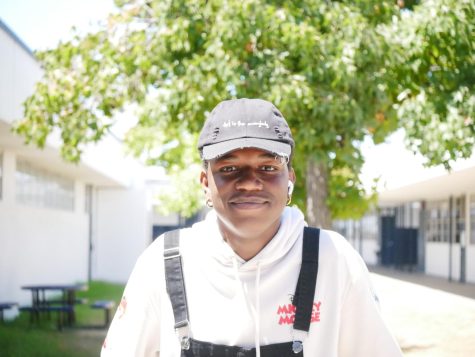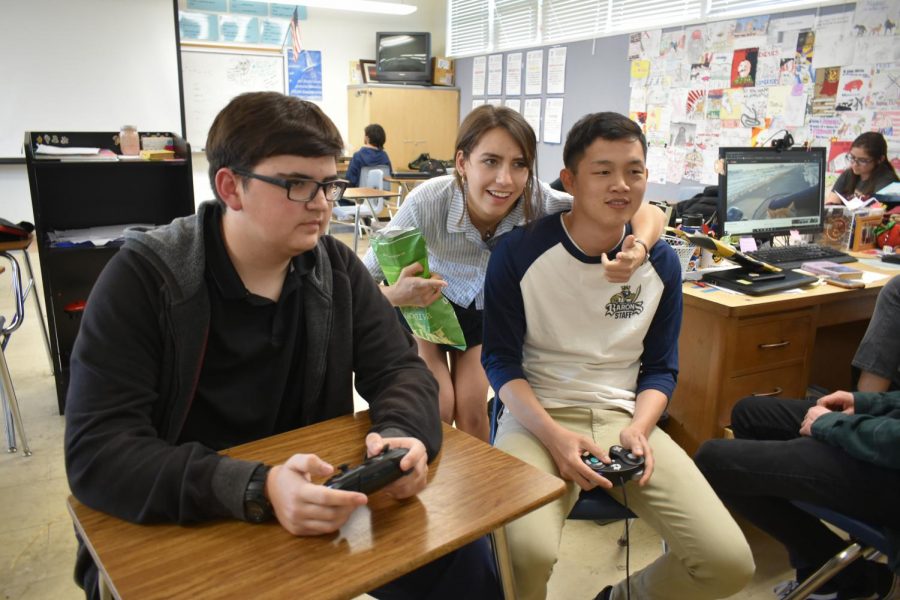Gaming in class
Exploring the role video games play at school
IB English HL1, English 9 Accelerated and Esports club advisor Raymond Chhan (right) plays Super Smash Bros with junior Dillan Busk (left). Students were receiving tips from BVH alumnus Georgina David (middle) who often visits campus to watch Chhan’s matches.
Friday afternoons in room 406 at Bonita Vista High (BVH) are usually spent playing video games like Super Smash Bros Ultimate and Mario Kart. Side by side, IB Literature HL1, English 9 Accelerated and Esports club advisor Raymond Chhan and one of his students sit with their controllers in hand.
Meanwhile, in room 506, Head Athletic Trainer, Human Anatomy and Physiology teacher and Career Technical Education (CTE) Sports Medicine teacher George Lafiguera incorporate video games into his curriculum for projects and homework. Both Chhan and Lafiguera share their enjoyment for video games with their students in diverse ways at BVH.
“I like video games. I’m actually a pretty big nerd. [I have] always played a lot of video games since I was a kid, starting with Super Smash Bros. It’s one of the earliest games I played,” Lafiguera said.
Lafiguera typically plays video games with his students after school or on special occasions at the end of the school year. However, he also incorporates Minecraft Education Edition into his curriculum for projects where they have to create models of muscles.
“[Minecraft Education Edition has] been a pretty easy resource to incorporate into the classroom considering all kids like playing. We do a lot of modeling projects where you have to build stuff,” Lafiguera said.
Furthermore, Chhan uses video games as a destresser for his students. Having Esports Club events after school at the end of the week is a way for students to do something they enjoy to release stress.
“It’s a more relaxing environment; it can be competitive but it’s something that [the students] enjoy on their off time,” Chhan said.
Video games also allow students to connect to teachers on a more personal level. However, both Lafiguera and Chhan expressed that although they share interests with their students, there still is a professional relationship that exists between students and teachers.
“Chhan is still our teacher; he’s still highly respected. We don’t treat him any less when he’s playing with us. Ironically, he’s the best out of all of us, so it’s like a mentor-mentee relationship. But it’s always out of respect for Chhan,” Esports Club Vice President and senior Ajani Oquendo said.
At times, Lafiguera does not even play with students but simply has conversations with them about new updates or characters. Both Lafiguera and Chhan express that video games are a way to show their students that teachers are more than just educators and they share similar interests.
“A lot of students spend a lot of time playing video games. So it’s great that some teachers can share that passion with them,” junior Dillan Busk said.
The Esports Club mainly focuses on building a community of people that share the love for playing video games. Most members have played Super Smash Bros Ultimate or Mario Kart before joining, however, the club is open to anyone who wants to begin playing video games as well.
“I think [the Esports club] provides a nice safe space for [students] to try to do something that they enjoy, and where they can engage in social [activity]. [When students engage in these activities] they can find their community and find people that are interested in the same things,” Lafiguera said.
Video games are also an emotional and mental outlet for many students at BVH. According to BVH psychologist Khanh Nguyen, if video games are implemented correctly, they can provide many educational benefits.
“In terms of being effective in school, I think [it is] a good motivator for students as well as a good alternative way for students to engage. Some kids work better just being on a screen, where they’re allowed to think at their own pace, and some [are] better, maybe at a real-life scenario. It gives us opportunities to learn in different ways,” Nguyen said.
Nguyen also mentioned that video games can help with problem-solving skills as most video games have a problem that allows the gamer to think about how to work out a solution.
“[Esports is] obviously a community where you’ll learn skills on how to interact with people and how [to] take defeats [and] victories. [The skills you learn] really apply to a lot of different kinds of situations you can have in life where you need to approach things with different perspectives,” Oquendo said.

I’m Marina Santana and I joined newspaper for the 2018-2019 school year, making this school year my second year on staff. This year I am sports section...

I am a senior and this is my second year on newspaper and I have really enjoyed being part of it. Journalism has been a way for me to learn new things...

I am a senior at Bonita Vista High (BVH) and this is my third year on staff. In previous years, I was working as a staff writer. This year, I am one...


cierra • May 8, 2020 at 3:12 am
As a student reading about this, I think this is a really good idea for how teachers and students connect with each other on a personal level. This lets teachers and students have a deeper connection and have a relationship rather than just teaching work and not really building trust and a connection with the students. I also like how this time playing games after school is a great opportunity for students to also connect with other students with something they both enjoy and this way can be easier to make friends. Overall I really like the Esports Club’s idea of thinking about making it in the first place and they should continue it.